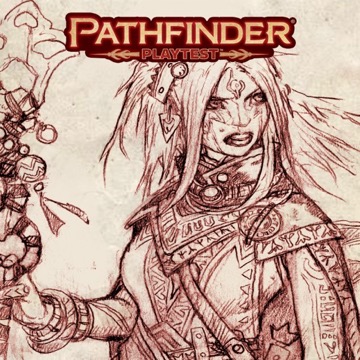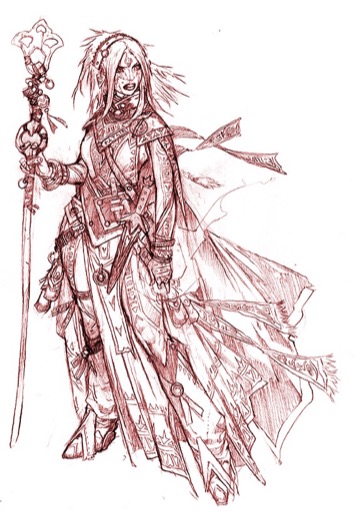Their magical blood gives sorcerers their spellcasting power, and it's been a major part of the class since Pathfinder's inception. So for the Pathfinder Playtest, we're going all in: your character's bloodline determines her spell list!
Bloodlines
You pick your bloodline at 1st level, which tells you which spell list you use: arcane, divine, primal, or occult (the last of the four magical traditions, which we'll cover in a future blog!). It also defines some of the spells you know. For instance, the demonic bloodline gives you the divine spell list and the fear spell at 1st level, in addition to two other spells that you choose yourself from the divine list. In some cases, the special spells from your bloodline come from other lists. For example, the demonic bloodline gives you slow when you learn 3rd-level spells (for the sin of sloth) and disintegrate when you learn 6th-level spells. There are a couple more. How about we look at that whole bloodline entry and you can make your own guesses about which ones are from other lists?
Demonic
The demons of the Abyss debase all they touch, and one of your ancestors fell victim to their corruption. You're burdened with dark thoughts and the desire for destruction. This urge can be overcome if you choose to fight it, but the beauty of sin calls to you always.
Spell List divine (Pathfinder Playtest Rulebook 200)
Signature Skills Athletics, Deception, Intimidation, Religion
Granted Spells Cantrip: detect magic; 1st: fear; 2nd: resist energy; 3rd: slow; 4th: divine wrath; 5th: banishment; 6th: disintegrate; 7th: divine decree; 8th: power word stun; 9th: meteor swarm
Bloodline Powers Initial Power: glutton's jaws; Advanced Power: swamp of sloth (2); Greater Power: abyssal wrath (2)
You can see that the bloodline also determines your most important skills and gives you some bloodline powers. We've talked about powers before (see the cleric preview. These are special spells you can get only from specific classes, and they are cast using Spell Points rather than spell slots. They also automatically heighten to the highest level of spell you can cast. You start out with a number of Spell Points per day equal to your Charisma modifier, and if you have the demonic bloodline, you gain the glutton's jaws power, which you can cast at a cost of 1 Spell Point.
Glutton's Jaws Power 1
Necromancy
Casting [[A]] Somatic Casting, [[A]] Verbal Casting
Duration 1 minute
Your mouth transforms into a shadowy maw bristling with pointed teeth. These jaws grant you an unarmed attack you're trained in, dealing 1d6 piercing damage. They have the finesse trait.
Attacks with your jaws have the following enhancement.
Enhancement If the target was living, gain 1d4 temporary HP.
Heightened (2nd) Your jaws gain the effects of a +1 weapon potency rune (a +1 item bonus to attack rolls and an additional damage die) and the temporary Hit Points increase to 2d4.
Heightened (4th) The jaws gain the effects of a +2 weapon potency rune and the temporary Hit Points increase to 3d4.
Heightened (6th) The jaws gain the effects of a +3 weapon potency rune and the temporary Hit Points increase to 4d4.
Heightened (8th) The jaws gain the effects of a +4 weapon potency rune and the temporary Hit Points increase to 5d4.
At higher levels, you'll get to make a swampy morass that makes creatures slothful or call forth the dangers of an Abyssal realm.
The number of bloodlines in the Pathfinder Playtest Rulebook is fairly small, since we want to see how people react to the new style of the class with just a subset of the bloodlines. In the book, you'll see the following bloodlines: aberrant (occult), angelic (divine), demonic (divine), draconic (arcane), fey (primal) and imperial (arcane). That last one comes from the magical traditions of ancient mortals and matches our iconic sorcerer, Seoni!
Spontaneous Spellcasting
This is our first preview of a spontaneous spellcaster! The sorcerer gets the same number of spells per day as a wizard, but she has a number of spells she knows permanently instead of preparing them from a spellbook every day. The spells she knows make up her spell repertoire. That means she can choose which spell to cast each time she casts a spell instead of needing to plan ahead. It's worth noting that the sorcerer now learns spells at the same character level as the wizard: 2nd-level spells at 3rd level, 3rd-level spells at 5th level, and so on.
As you level up, you learn new spells and can replace some of the spells you previously had with new ones. This lets you get rid of some spells that were great options when they were at your highest level but maybe aren't worth casting anymore.
The sorcerer's spellcasting is based on her inborn magical potency, so she uses her Charisma for her spell rolls and spell DCs. Because Charisma also adds to Resonance Points, the sorcerer can make up for some of her limited spell choice compared to the wizard's spellbook by supplementing her spell selection with more scrolls, staves, and wands.
Sorcerer Features
Many of the sorcerer's class features were explained under bloodline, as most of them tie back to that choice. The sorcerer gains her advanced power at 6th level and her greater bloodline power at 10th level. As with other spellcasters, her proficiency with spell rolls and spell DCs increases to expert at 12th level, master at 16th, and legendary at 19th.
The sorcerer gets one other class feature, called spontaneous heightening. As mentioned before, some spells in your lower-level spell slots get less useful as you go up in level. However, there are some spells you might want to cast with any of your slots. The spontaneous heightening feature lets you choose two spells at the start of each day that you can cast as their heightened versions using any of your spell slots. That means that if you want your angelic sorcerer to be able to cast 1st-level heal, 2nd-level heal, and 3rd-level heal, you can choose your 1st-level heal spell with spontaneous heightening rather than needing to learn the spell in your spell repertoire at all three spell levels. Then you can cast a 1st-level heal to top off someone's Hit Points when they're almost at full and still cast a 3rd-level heal in the middle of a fight to really save someone from the brink!
Sorcerer Feats
The sorcerer's feats primarily deal with her spells. Sorcerers get metamagic feats, many of which they share with other casters. One we haven't shown off yet is Overwhelming Spell at 8th level, which lets a spell that deals acid, cold, electricity, or fire damage ignore the first 10 points of a target's resistance.
If you want to make a blaster, you can pick up Dangerous Sorcery, which increases the damage of your spells by their spell level (with the exception of cantrips). You can also take Blood Magic at 8th level, which uses the magical potential in your blood to grant temporary Hit Points to you or a target of your spell if you're bleeding when you cast it.
One of my favorite cycles of feats are the evolution feats, which reinforce the themes of each magical tradition. Arcane Evolution makes your arcane sorcerer trained in a skill and lets you add a spell from a scroll to your spell repertoire for the day when you prepare each morning. Divine Evolution lets you channel energy like a cleric. Occult Evolution gives you a skill and lets you pick a spell with the mental trait to add to your repertoire each day. Finally, Primal Evolution lets you cast summon nature's ally as an innate spell once per day at the highest spell level you can cast.
How about a 20th-level feat? Sorcerers can take a feat to gain 10th-level spells of their tradition, but you might want to look at other options, like Wellspring Spell. This metamagic feat lets you cast a 5th-level or lower spell once per minute without expending the spell slot!
What sort of predictions do you have for the bloodlines? What spells will they get? Does this new scheme make you more or less likely to play a sorcerer? Do you want to try out a gnome fey sorcerer? How about an angelic sorcerer with the heal spell? Let us know in the comments, and start preparing for when you get the book!
Logan Bonner
Designer











